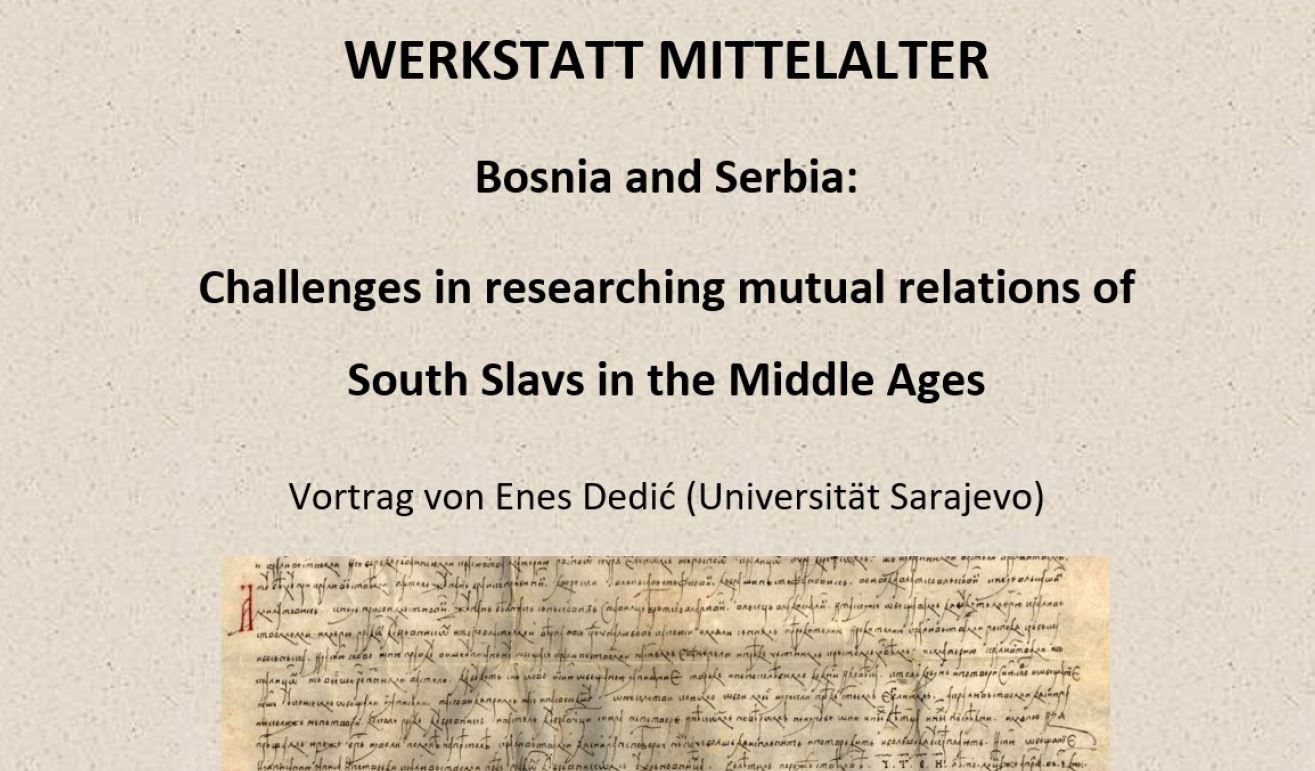WERKSTATT MITTELALTER
Vortrag von Enes Dedić (Universität Sarajevo, im Rahmen Erasmus+ Programmaustausches):
Titel: "Bosnia and Serbia: Challenges in researching mutual relations of South Slavs in the Middle Ages"
Wann: Montag, 9. Mai 2022, 18.30 – 20.00 Uhr
Wo: UR 09.34, Heinrichstraße 26/III, 8010 Graz
Näheres zum Vortrag:
The treatment of mutual relations between Bosnia and Serbia published in the book “Bosnian Kingdom and Serbian Despotate (1402-1459)“ released in 2021, is the first study of the treatment of relations between the two South Slavic states. The connection of these countries was frequent in the Middle Ages, they were neighbors who developed political, expansionist, dynastic, economic, cultural and religious relations. The quality and tradition of relations between the two countries is evidenced by the fact that the first information about the Bosnian state from the 10th century, contained in the writings of Emperor Constantine VII Porphyrogenitus, speaks of Bosnia's vassal status towards neighboring Serbia. As several historical sources have been preserved from the following centuries, data on the mutual relations between Bosnia and Serbia are increasingly branching out. This process is accompanied, albeit to a lesser extent, in archival documents of neighboring countries, as well as various chronicles and annals. Therefore, in dealing with this topic, we can talk about writing the relationship between the two countries through the knowledge of closer or farther neighbors. Although the treatment of this topic was recognized by historians of the former Yugoslavia, and in the 1980s, through a major historiographical project, it was outlined as very important for processing, but this did not happen. One of the special features of the relations between Bosnia and Serbia in the Middle Ages is the fact that older historiography, which ideologically colored conclusions and claims made over a period of two centuries, made this topic very sensitive and made its scientific processing difficult. The historiographical problem is the perception of the relationship between the medieval South Slavic states and the fact that these political spaces in later centuries passed through several different state frameworks, and during the 20th century were an integral part of one state. At that time, from the perspective of Yugoslavia, they were talking about "our medieval peoples and states". New political frameworks after the disintegration of Yugoslavia brought new scientific views and orientations in the interpretation of the medieval past of the South Slavic countries. The aim of this short lecture is to show the problems, shortcomings and difficulties in researching the relations between the South Slavic countries and the peoples in the Middle Ages on the example of one research.
Näheres zur Person:
Enes Dedić completed his doctoral studies at the University of Sarajevo in 2017 by defending his dissertation Bosansko kraljevstvo i Srpska despotovina (1402-1459. godine) (Bosnian Kingdom and Serbian Despotate (1402-1459)). Since 2016, he has been employed at the Institute of History of the University of Sarajevo and is currently a senior research associate for older history - the Middle Ages. His area of scientific interest is the political and economic history of Bosnia and Southeast Europe in the 14th and 15th centuries. He conducted a number of researches in the State Archives in Dubrovnik, and in the State Archives in Zadar. He has published one monograph, scientific papers and reviews of scientific publications, and participated in scientific gatherings and promotions of new scientific publications. He has been a member of the editorial board of the journal Historical Searches since 2020 and Radovi of the Museum in Visoko.
Um Anmeldungen wird gebeten. Kontakt: +43 316 380 – 8089 oder E-Mail: brigitte.walter(at)uni-graz.at
